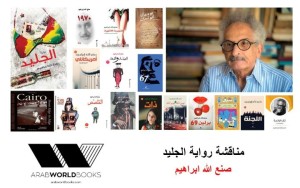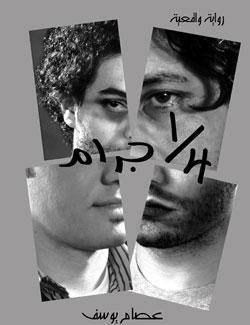Nadia Abou el Magd, Foreign Correspondent
The National November 3. 2008
CAIRO // The bestselling book Quarter Gram, which is now in its eleventh print run and is being made into a film about the lives of six drug addicts from Cairo’s upper class, touches upon an epidemic in Egyptian society.
Based on a true story, narrator Salah recounts his story and that of his five friends – Mido, Zoni, Rico, Bono and Lol – growing up in the 1980s and 1990s, as their experimentation with drugs descends into full-blown addiction.
In the space of 10 years, the Quarter Gram, slang for heroin, leads to the death of friends, imprisonment, loss of jobs and girlfriends, the squandering of fortunes and agony for loved ones.
“Salah is one of nine million addicts in Egypt,” said Essam Youssef, the author, now in his 40s, at a recent discussion of his book in a cultural centre in Cairo. “I lived this era and they are my friends.”
While the exact number of drug addicts in Egypt is hard to determine, official estimates put the number at about six million.
But Youssef, who spent three years researching drug abuse and addiction before writing Quarter Gram, said official data is compiled only from addicts who are jailed or admitted to hospital and hardly touches on abusers in schools and universities. The real figure could be as high as 9m, he said.
A recent study published by Egypt’s National Council for Fighting and Treating Addiction said the majority of drug users are between the ages of 15 and 25.
Dr Nasser Loza, the secretary general of the Mental Health in Egypt organisation and director of Behman Hospital, the first private psychiatric hospital in Egypt and known for treating drug addiction, said estimates of the numbers of addicts are “notoriously inaccurate worldwide”, but referred to a recent survey conducted in eight governorates in Egypt in which 19.5 per cent of respondents said they used one or more kind of drugs.
Marijuana is the most widely available drug in Egypt. It is used at private parties and is socially acceptable as many believe that, unlike alcohol, it is not religiously prohibited because it is not mentioned in the Quran.
“I moved from my neighbourhood in Shoubra and sold my house cheaply because it was above a cafe where people were smoking Bango [a type of marijuana] all the time; it was killing us,” said Hosnia Samir, a 48-year-old mother of two, venting her anger after Youssef’s talk. “We kept calling the police, but they did nothing.”
Apart from marijuana, heroin, cocaine and methamphetamines such as ecstasy are easy to find. In his discussion, Youssef said the price of heroin in Egypt – at 100 Egyptian pounds (Dh66) a gram – is among the cheapest in the world.
In Quarter Gram, 640 pages and written in colloquial Arabic, Youssef humanises drug addicts and conveys their suffering, lifting the veil of criminality and shame through which they are typically regarded.
Apart from harming oneself, the addict causes his loved ones great suffering too, Youssef said.
Hesham, 33, a recovering drug addict, agreed. “The harm I caused my family during my long journey of addiction is much more difficult for me than my prison experiences, accidents, hospitals, even the death of some of my friends,” said Hesham, who started taking drugs, including heroin, when he was 13.
His recovery began almost two years ago after “hitting rock bottom, feeling I’m hurting all the people who love me and that I was going mad”, he said.
Youssef said his book was a message of hope and it is possible for addicts to overcome their dependency on drugs. He praised such international organisations as Narcotics Anonymous, which holds more than 43,000 meetings every week in 127 different countries.
Dr Loza said Youssef’s book was “a breath of fresh air” and distributes copies of it to the addicts he treats.
“The message is better delivered by someone who went through the experience than the doctor, the nurse, or their families,” he said.
“Drug addiction is a disease not a crime, this is the message I’ve been trying to spread since 1989.”
The Egyptian government in recent years has taken notice of the issue of drug addiction, launching rehabilitation programmes, ad campaigns and support hotlines.
Celebrities are getting in on the act too. In March, Amr Khaled, a popular Egyptian preacher, launched a five-week anti-drug campaign to attract attention to the growing problem of drug abuse among youth in the Middle East.
Dr Loza said while drug addiction could be reduced it would never be eliminated.
“We won’t be able to eliminate the phenomenon of drug addiction in Egypt, no society can claim that, it’s part of human behaviour,” he said. “We should work on harm reduction.”
Bestseller lays bare drug abuse in Egypt
By: Editor - on: Thursday 1 January 2009 - Genre: Book Reviews
Upcoming Events

Sonallah Ibrahim's Ice
June 26, 2025
Join us for a special discussion on Sonallah Ibrah...

Arabia Felix - Alarabia Alsaida in Bayt Yakan
April 15, 2025
Arabia Felix by Thorkild Hansen, and translated by...

A writer, a vision, a journey: a conversation with Professor Ilan Pappe
March 15, 2025
This event took place on 15 March, 2025 . You may...

مسافر يبحث عن ماء
February 17, 2025
تقيم نقابة اتحاد كتاب مصرشعبة أدب الرحلات تحت رعاي...
